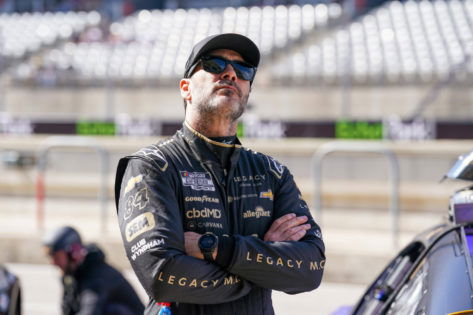“The economic model is broken for the teams.” Curtis Polk, 23XI Racing co-owner, said these words back in 2022. He was a part of the Race Team Alliance, a group dedicated to negotiating with NASCAR about the charter deal renewal in 2025. However, we all know what happened. The RTA’s unity fell apart in September 2024 as only two teams stood out to fight. As Michael Jordan wages a battle in the NASCAR lawsuit, Jimmie Johnson offers a perspective on the situation.
After retiring from full-time racing in 2020, the seven-time Cup Series champion has engaged in other avenues. These include buying a stake in Legacy Motor Club in 2023. As Jimmie Johnson treads through his ownership duties, he knows the economics of the sport by the pulse now, especially with NASCAR embroiled in a legal dispute with two of its teams.
When 23XI Racing and Front Row Motorsports sued NASCAR last year, their accusations were clear. The lawsuit read that NASCAR engaged in “anticompetitive and exclusionary practices” to “enrich themselves at the expense of the premier stock car racing teams.” The root of this legal case lay in how NASCAR distributed broadcast finances under the previous charter system. Tracks receive 65% of TV revenue, 10% for NASCAR, and 25% for the teams. This left teams heavily reliant on sponsors for their revenue. Although the 2025 media agreement amounted to a 40% increase in the share for teams, they may still be falling short of funds, as Jimmie Johnson would reveal.
In a recent episode of ‘Business of Sport’, Jimmie Johnson broke down how Cup Series teams earn money. Johnson said, “A lot of it really depends on on-track performance. The better you finish, the more revenue you share in – there’s three different buckets of revenue that you share in. The better your averages are every year, the better you finish each race – the more cash you get. The media rights feed into your prize money. For prize money, you have your annual year-end and race purse. So those guys are on one bucket. Then you have license merch, you have your sponsorship, and that’s it.”
This isn’t the first time a team owner has talked about the degree of control sponsorships have on the NASCAR garage. Take a look at Paul Menard’s case. A driver whose average finish was lower than 15th in the Cup Series was kept on because he could bring sponsorships. Chase Briscoe reflected this perfectly when he said, “There’s, I mean, it’s always more money-driven, but it has changed. I feel like once you get to the cup level, it is a little bit different. Like typically at the cup level at least, like for the most part, everybody kind of just goes and gets who they want and, they figure out the funding. But you still definitely have, you know, parts of the cup series where guys are, you know, paying to be there. They have a sponsor or something.”
NASCAR, Motorsport, USA Daytona 500 Practice Feb 18, 2023 Daytona Beach, Florida, USA NASCAR Cup Series driver Jimmie Johnson 84 slides into his car before practice for the Daytona 500 at Daytona International Speedway. Daytona Beach Daytona International Speedway Florida USA
But the conversation gets tricky when you zoom into NASCAR’s part. In 2019, International Speedway Corp. and Speedway Motorsports Inc. went private as Jim France acquired most of the racetracks. That has complicated the revenue model quite a bit – as NASCAR hogs most of the pie. Jimmie Johnson highlighted that: “NASCAR has its own strategy in negotiations that it handles. Because here’s where it gets even more interesting. NASCAR not only owns the sport, but they also own half the tracks that we race in. We’re now racing a spec car that NASCAR controls the vehicles and their production…So the evolution of our sport – it’s changed quite a bit.”
As Michael Jordan and Co. go on with the lawsuit, who knows how the charter system will evolve further? Meanwhile, Jimmie Johnson is dealing with a lawsuit of his own.
Johnson gets a sharp reply
Although Jimmie Johnson’s criticism of the charter system is indubitable, he is embroiled in a related controversy. In January 2025, Johnson became the majority stakeholder of Legacy Motor Club, aiming to expand the team to three cars. For that purpose, talks began with Rick Ware Racing to buy one of its charters. A purchase deal reportedly went through in early March – but there was a discrepancy in the timeline. While Johnson alleged the charter transfer was to be done by the start of 2026, Rick Ware thought it was for 2027. Subsequently, LMC filed a lawsuit against RWR for illegally backing out of the charter purchase agreement.
However, Rick Ware has recently issued a statement in response. He debunks most of the claims made – that RWR was strapped for cash and that they violated the agreement terms. RWR’s response reads: “This lawsuit distorts the actual facts and is a misguided attempt to tarnish our reputation. RWR has negotiated in good faith and operated with the highest standards of integrity and professionalism. We are confident that the truth will prevail and look forward to swiftly resolving this matter through the proper legal channels.”
Evidently, Jimmie Johnson is caught in the thick of the NASCAR charter system at present. Let us see how he navigates his problems while analyzing the sport’s situation.
The post Jimmie Johnson Exposes the Harsh Economics Behind NASCAR’s Charter System and the Sport’s Revenue Tug-of-War appeared first on EssentiallySports.
